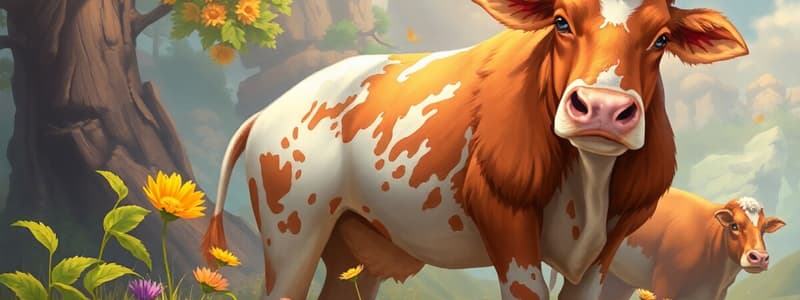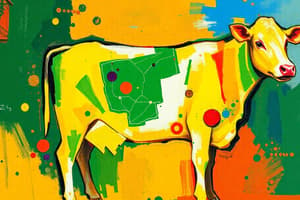Podcast
Questions and Answers
The protein and mineral content of a feed, its energy composition, and amount of energy that can be used and efficiently utilized by the animal from it refers to:
The protein and mineral content of a feed, its energy composition, and amount of energy that can be used and efficiently utilized by the animal from it refers to:
- Nutrient
- Nutrition
- Nutrient requirement
- Nutritive value (correct)
The main product of photosynthesis in plants is:
The main product of photosynthesis in plants is:
- Carbohydrate (correct)
- Minerals
- Lipid
- Protein
Ration pertains to the:
Ration pertains to the:
- Specific nutrient for a group of animals for 24 hours
- Feed allotment for a group of animals for 24 hours
- Specific nutrient requirement of a single animal for 24 hours
- Feed allowance for a single animal for 24 hours (correct)
An energy feed or energy concentrate are those products containing:
An energy feed or energy concentrate are those products containing:
Dry forages and roughages have:
Dry forages and roughages have:
Which of the following describes a supplement?
Which of the following describes a supplement?
Which of the following describes a balanced ration?
Which of the following describes a balanced ration?
Metabolic water could be produced when these nutrients are catabolized for energy production except:
Metabolic water could be produced when these nutrients are catabolized for energy production except:
Antibiotics, food colorings, flavors are considered as:
Antibiotics, food colorings, flavors are considered as:
Which of the following is not classified as a nutrient?
Which of the following is not classified as a nutrient?
The following nutrients are organic except:
The following nutrients are organic except:
The following feeds is a forage except:
The following feeds is a forage except:
The following processes are the main concern in the study of animal nutrition except:
The following processes are the main concern in the study of animal nutrition except:
In cold water, water requirements are ____ because feed intake is __.
In cold water, water requirements are ____ because feed intake is __.
The following are the functions of water except:
The following are the functions of water except:
Feedstuff with high water absorbing characteristics ____ the drinking water requirements in animals.
Feedstuff with high water absorbing characteristics ____ the drinking water requirements in animals.
The last event in the process of nutrition is:
The last event in the process of nutrition is:
Excessive intake of water by domestic animals will:
Excessive intake of water by domestic animals will:
Which of the following situations render domestic animals to take less feed than its normal consumption?
Which of the following situations render domestic animals to take less feed than its normal consumption?
Birds have lower water requirement than mammals because they excrete:
Birds have lower water requirement than mammals because they excrete:
Which of the following is least likely to be considered as an essential nutrient for animal nutrition?
Which of the following is least likely to be considered as an essential nutrient for animal nutrition?
Which of the following nutrients is not a building block for bodily tissues but is required for enzyme function?
Which of the following nutrients is not a building block for bodily tissues but is required for enzyme function?
Flashcards are hidden until you start studying
Study Notes
Introduction to Animal Nutrition
- Nutrient refers to components in animal feed that support health and growth, including proteins, minerals, and energy.
- Nutritive value is the ability of feed to provide necessary energy and nutrients efficiently.
Photosynthesis and Energy
- Carbohydrate is the main product of photosynthesis, supplying energy to plants.
Rations and Feed Types
- Ration indicates the specific nutrient intake for a single animal over 24 hours.
- Energy feeds contain at least 20% protein or high energy with low fiber.
- Dry forages and roughages generally contain 18% fiber and provide high energy.
Supplements and Balanced Rations
- Supplements are feeds or mixtures that enhance the nutritional quality of a base feed.
- A balanced ration meets the distinct nutritional needs of an animal species and class.
Metabolic Water and Nutrient Catabolism
- Under typical conditions, metabolic water can be produced from lipids, carbohydrates, and proteins; minerals do not contribute.
Feed Additives and Nutrients
- Additives include antibiotics, food colorings, and flavors to enhance feed properties.
- Not all substances are classified as nutrients; for example, limestone is not considered a nutrient.
Organic Nutrients and Forages
- Organic nutrients include vitamins, nucleic acids, and lipids; minerals are inorganic.
- Corn grains are not classified as forage; they do not qualify under typical feed classifications.
Animal Nutrition Processes
- Key processes in animal nutrition focus on nutrient metabolism, digestion, and waste excretion, while appetite improvement is less critical.
Water Requirements
- In cold water, increased water requirements coincide with decreased feed intake.
- Feedstuffs that absorb high amounts of water can lower drinking water needs in animals.
Nutrition Process and Effects of Water Intake
- Excretion is the final stage of the nutrition process.
- Excessive water intake can reduce feed consumption, harm animals, or cause bloating.
Factors Affecting Feed Consumption
- Factors such as pregnancy, cold weather, and unavailability of drinking water may cause animals to eat less.
- Birds have lower water needs due to excreting uric acid in a solid form compared to mammals.
Essential Nutrients
- Essential nutrients include fat-soluble vitamins, minerals, and polyunsaturated fatty acids.
- Carbohydrates contribute to energy but are not structural; vitamins are necessary for enzymatic functions.
Indispensable Nutrients
- Indispensable nutrients are those that animals cannot synthesize and must be obtained from their diet.
Studying That Suits You
Use AI to generate personalized quizzes and flashcards to suit your learning preferences.



